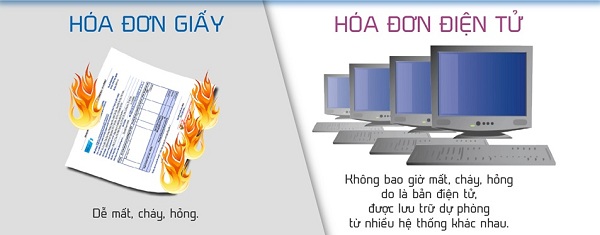The answer is: No. However, aiming for the target by the year 2020, with approximately 90% of businesses using electronic invoices or 90% of goods traded using electronic invoices, the use of electronic invoices to replace paper invoices is currently being encouraged for implementation.
Practical Issues in the Use and Management of Paper Invoices
There are still limitations in the practical use and management of paper invoices. Many entities exploit the loopholes in the Law on Enterprises to establish multiple "shell" companies to issue fake invoices, use "illegal" invoices to claim VAT deductions, refunds, or payments from the State budget. Additionally, taking advantage of the regulation that does not mandate the transfer of invoice data to tax authorities, numerous entities issue invoices but do not declare taxes with the intent of tax evasion. Given this situation, the Ministry of Finance deems it necessary to amend Decree 51/2010/ND-CP and Decree 04/2014/ND-CP partially to facilitate businesses and taxpayers while preventing budget losses and combating fraud in State budget payments.
On April 25, 2017, the Ministry of Finance submitted a proposal to the Government of Vietnam to draft a new Decree to replace Decree 51/2010/ND-CP and Decree 04/2014/ND-CP.
According to the Ministry of Finance’s assessment of electronic invoice usage:
- The adoption of electronic invoices by businesses has been evaluated positively, receiving customer acceptance, providing practical benefits in terms of time and cost savings for businesses. Consequently, this has promoted the application of information technology in business management, accounting, and improving production efficiency, service quality, and the competitiveness of enterprises.- From the customer's perspective, the habit of using paper invoices has gradually changed, with customers showing more cooperation with businesses using electronic invoices. The use of electronic invoices has facilitated customer payments, allowing them to access the seller's website to view and download invoices as needed, thus eliminating the need for storage and maintenance of paper invoices, reducing the risk of invoice loss, and saving costs by not having to print on paper.

According to the content of the Draft Decree on Invoices, the timeline for the use of electronic invoices is as follows:
From January 1, 2018, the following entities must use electronic invoices/electronic invoices with tax authority codes for goods sales and service provision:
- Enterprises and public service providers using electronic invoices from the issuance of tax codes and periodically transferring invoice data to tax authorities include:- Enterprises established under legal regulations in industrial parks, economic zones, export processing zones, and high-tech zones;- Public service providers engaged in production and business as regulated by law;- Enterprises and banks with a charter capital of 15 billion VND or more, based on the actual contributed capital at the time of invoice issuance notice, including branches and affiliates in different provinces and cities from the headquarters that declare and pay VAT.- Enterprises and organizations using electronic invoices with authentication codes from tax authorities include:- Newly established enterprises (excluding the aforementioned types);- Enterprises and organizations purchasing invoices from tax authorities, including enterprises violating invoice management and use, high-risk enterprises as notified by tax authorities, and other entities purchasing invoices from tax authorities before January 1, 2018, must use electronic invoices with tax authority codes following tax authority notifications.
From January 1, 2019: 30% of the remaining organizations and enterprises.
From January 1, 2020:
- 80% of enterprises and organizations using electronic invoices, electronic invoices with tax authority codes.- Initial implementation of electronic invoices for business households with annual revenue of 3 billion VND or more.
 Article table of contents
Article table of contents





.Medium.png)
.Medium.png)
.Medium.png)
.Medium.png)
